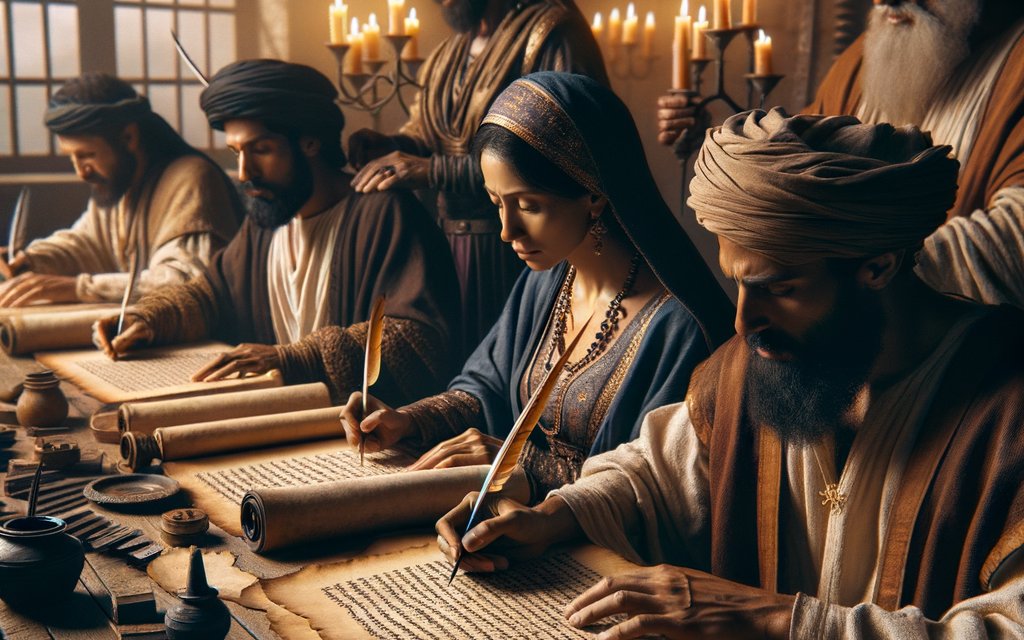Famous Authors Who Penned the Bible
Famous Bible Authors
The Bible, revered by billions, stands as an unparalleled mosaic of divine, ethereal prose. The hands that shaped its text were guided by faith, each character imbibed with the sacred chorus of their labor. Among its historic pages, one cannot help but be drawn to the wisdom of Moses. A towering figure in the Old Testament, Moses is accredited with the authorship of the Torah, the Pentateuch, or what we often call the first five books of the Bible: Genesis, Exodus, Leviticus, Numbers, and Deuteronomy. His life’s odyssey—from the waters of the Nile to the heights of Mount Sinai—chronicles the birth of a people and the laws that would guide them.
Moreover, Moses unveils a profound connection between mankind and divinity. In Exodus 34:27, God’s mandate to Moses is clear: “Then the Lord said to Moses, ‘Write down these words, for in accordance with these words I have made a covenant with you and with Israel.'” Hence, Moses’ narratives prove to be more than historical documentation; they are covenants etched in time. His role is evocative of a scribe not merely transcribing events but chiseling the very essence of God’s will into stone.
When one reads the opening of Genesis, “In the beginning, God created the heavens and the earth,” we’re introduced to a vision of cosmic grandeur. The sinuous flow of Moses’ words captures the inception of everything, knitting together Earth’s fate and Heaven’s omnipresence. It is no small feat to navigate this terrain, one thick with metaphysical complexity and narrative beauty, yet Moses does so with a finesse few have ever rivaled.
Biblical Writers
Beyond the towering figure of Moses, another poignant voice beckons through Scripture, weaving threads of prophetic vision and heartfelt lamentation—the voice of Isaiah. An immensely influential prophet, Isaiah’s writings, broadly encapsulated in the Book of Isaiah, teem with hope and redemption, even as they confront desolation and divine wrath. His prophetic articulations are nothing short of celestial, suspended between the agony of a disobedient nation and the promise of salvation.
Isaiah’s words echo the celestial decree, “Comfort, comfort my people, says your God. Speak tenderly to Jerusalem” (Isaiah 40:1-2), marking a shift from judgment to hope. His prophecies encapsulate both a critique of societal morality and a vision for future tranquility. Isaiah dares to imagine, with poetic poignancy, a time when “the wolf shall dwell with the lamb, and the leopard shall lie down with the young goat” (Isaiah 11:6). His writings, both haunting and hopeful, serve as a timeless guidepost.
It is Isaiah’s courageous blend of reprimand and reassurance which paints a vivid picture of a world held together by divine promise. The lyrical elegance of his laments, paired with an unyielding call for righteousness, delineates a symbiotic relationship between divine intervention and human action. Isaiah augments the Bible with an orchestration of hope, foreshadowing both the tribulations and ultimate triumph that form its crux.
Notable Scripture Contributors
Venturing further, one is immersed in the wisdom and lyrical profundity of David, the shepherd-king whose psalms resonate with the heartbeats of countless generations. David’s Psalms, brimming with raw emotionality, form the heart of the Bible’s poetic testament. His writings reflect the spectrum of human emotion, from staggering despair to exultant praise, providing an intimate portrait of faith’s tumultuous journey.
“The Lord is my shepherd; I shall not want” (Psalm 23:1), David writes, crafting an empathetic vision of divine care. His psalms invite readers to traverse valleys of shadow and scale heights of divine revelation. The Psalms encapsulate a theological paradox—the mysterium tremendum where divine glory and human frailty intersect. David’s artistry enables us to navigate these sacred waters, urging a personal dialogue with the Divine.
The textual mastery of David lies in his ability to capture visceral human experiences within the cadence of spiritual inquiry. His words remind us that anguish and adoration can coexist in the sacred songs of the faithful. Through phrases such as “Create in me a clean heart, O God, and renew a right spirit within me” (Psalm 51:10), David’s psalms extend an invitation to renewal and redemption, echoing through time’s corridors, whispering to our collective consciousness the enduring refrain of grace.
As we reflect upon these seminal authors—Moses, Isaiah, and David—it’s evident that their contributions transcend mere textual creation. They have fashioned bridges between the ephemeral and the eternal, inviting us to walk paths of introspection and connection. In the rhythm of their words, we find the divine heartbeat, a cadence urging us towards contemplation and deeper faith. Let their legacies guide your steps, their scripts shape your spirit, and their divine inspiration kindle a flame within your heart as you navigate your own sacred narrative.











